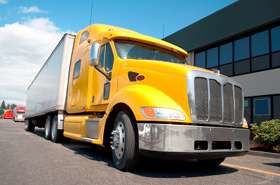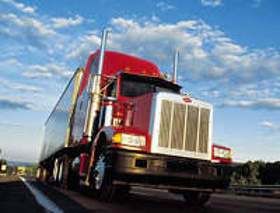Mechanical Issues
Topic 18011 | Page 1
My first truck was a Volvo and I loved it but unfortunately it had just about the same issue as Patrick, it went into derate. Wouldn't regen and wouldn't pull hills. It was fixed in the worst way possible.... it turned into a Freightliner cascadia within just a few hours of it being at the dealer. Sad times.
Along with those fuses you should have spare lights and Gladhand seals. The lights can be changed as long as you can reach them. But I've had a few "hold my beer and watch this" moments when I needed to be somewhere.
I've also replaced some airlines on the back of the truck. Not really a big deal.
My favorite mechanical issue was after I parked a Freightliner cascadia for home time while is was storming pretty hard for days. I got back in it and started it up and the lights went nuts... Every light on the truck flashed at different times and I was fairly close to a dealership so I waited till traffic was nonexistent and drove it to the dealer... surely someone thought I was a tow truck or an ambulance had they seen me.
The lighting module had gotten water inside and when I kicked the ignition on it fried it. So I went back home and was paid breakdown pay while at home.
HOS:
Hours Of Service
HOS refers to the logbook hours of service regulations.If you carry a drill and a boxcutter it will save you time. When you go to pick up a trailer and it has a mud flap hanging. If it is hanging simply unbolt the rest of the bolts pull the mud flap off. Turn it over and cut it if need be (say it's one that has the angle on the outer edge) drill the holes and replace the bolts. Otherwise ask to have a new mud flap waiting for you at the closest truckstop.
Depending on what it is most places are happy to save money on a service call and let the driver deal with it. And that can work out good for you in the long run because you could be waiting for hours on something you could've done yourself in minutes.

I carry a full set of tools and common parts for my truck, glad hand seals, fuzzes, lights, pig tails, axel flange gasket. Gasket maker, epoxy, electrical tape, duck tape. Emergency tape, spear airlines. Shrink rap. As for problems let's just say the only think I have not got to peak into yet in the tranny. Smacking wood let's hope I don't have to eather.
I'm not a mechanic. So I fix nothing lol. Yeah I replace glad hand seal and a fuse..but that's it.
However I also haven't had any major problems. I could tell my air tanks were losing air and got it into shop...valve needed replacing. My locking jaws gave me issues latching to trailers..was hardened lube caked up. Rock hit windshield..... Nail in tires.
I've never been broken down on the road for anything. And the truck has spent most of its time in shop either for the APU (twice)....or me just having it looked at every six weeks. They check out all the warranted parts really good and have caught things I haven't. They replaced my pigtail when every ABS trailer light came on.
But I have never had issues with "omg..I need to get to shop asap" and felt unsafe.
The trailers are a different story..lights out...reefer not functioning properly.
No matter what. I message dispatch that I'm taking trailer into the terminal or a TA. Usually while I'm at a terminal I have the truck looked at for whatever it needs. Preventive maintenance is much better ;)
I carry filters in case TA doesn't have them. But prefer terminals for repairs.
Terminal:
A facility where trucking companies operate out of, or their "home base" if you will. A lot of major companies have multiple terminals around the country which usually consist of the main office building, a drop lot for trailers, and sometimes a repair shop and wash facilities.
SAP:
Substance Abuse Professional
The Substance Abuse Professional (SAP) is a person who evaluates employees who have violated a DOT drug and alcohol program regulation and makes recommendations concerning education, treatment, follow-up testing, and aftercare.
Reefer:
A refrigerated trailer.
TWIC:
Transportation Worker Identification Credential
Truck drivers who regularly pick up from or deliver to the shipping ports will often be required to carry a TWIC card.
Your TWIC is a tamper-resistant biometric card which acts as both your identification in secure areas, as well as an indicator of you having passed the necessary security clearance. TWIC cards are valid for five years. The issuance of TWIC cards is overseen by the Transportation Security Administration and the Department of Homeland Security.
APU:
Auxiliary Power Unit
On tractor trailers, and APU is a small diesel engine that powers a heat and air conditioning unit while charging the truck's main batteries at the same time. This allows the driver to remain comfortable in the cab and have access to electric power without running the main truck engine.
Having an APU helps save money in fuel costs and saves wear and tear on the main engine, though they tend to be expensive to install and maintain. Therefore only a very small percentage of the trucks on the road today come equipped with an APU.


Are the spare parts you carry purchased by you or the company? Or do you pick them from company terminals?
Terminal:
A facility where trucking companies operate out of, or their "home base" if you will. A lot of major companies have multiple terminals around the country which usually consist of the main office building, a drop lot for trailers, and sometimes a repair shop and wash facilities.

Are the spare parts you carry purchased by you or the company? Or do you pick them from company terminals?
The parts person at the Swift terminal in Utah gave me a stater kit of sorts. Spare light bulbs, fuses and seals.
Terminal:
A facility where trucking companies operate out of, or their "home base" if you will. A lot of major companies have multiple terminals around the country which usually consist of the main office building, a drop lot for trailers, and sometimes a repair shop and wash facilities.
Are the spare parts you carry purchased by you or the company? Or do you pick them from company terminals?
Both.. if you need anything on the road they will reimburse you for whatever it is or they will authorize a Comcheck.
Terminal:
A facility where trucking companies operate out of, or their "home base" if you will. A lot of major companies have multiple terminals around the country which usually consist of the main office building, a drop lot for trailers, and sometimes a repair shop and wash facilities.
Blew heater hose line there are valves to turn off flow from water pump Blew front rearend cant fix that and high pressure injector pump too also no fixin that
HOS:
Hours Of Service
HOS refers to the logbook hours of service regulations.Um.. how about a drive shaft that literally fell onto the ground when I was sliding tandems. The truck was fairly new and the bolts on the back of the tranny failed and literally sheared off. Blown axle seals. Anything else was simple fuse or bulb replacement.
Tandems:
Tandem Axles
A set of axles spaced close together, legally defined as more than 40 and less than 96 inches apart by the USDOT. Drivers tend to refer to the tandem axles on their trailer as just "tandems". You might hear a driver say, "I'm 400 pounds overweight on my tandems", referring to his trailer tandems, not his tractor tandems. Tractor tandems are generally just referred to as "drives" which is short for "drive axles".
Tandem:
Tandem Axles
A set of axles spaced close together, legally defined as more than 40 and less than 96 inches apart by the USDOT. Drivers tend to refer to the tandem axles on their trailer as just "tandems". You might hear a driver say, "I'm 400 pounds overweight on my tandems", referring to his trailer tandems, not his tractor tandems. Tractor tandems are generally just referred to as "drives" which is short for "drive axles".
New Reply:
New! Check out our help videos for a better understanding of our forum features

















Preview:








 TT On Facebook
TT On Facebook
Hi ya'll.
Patrick C had/has an issue with his truck which brings me to questions I have wanted to ask.
1) What mechanical issues have you encountered and how were they fixed? 2) Are there minor mechanical issues that a driver can fix if the company allowed it? If so, which are these minor issues?
In school I remember it said that you are supposed to carry extra fuses....that's why I ask about minor issues. Your answers are informative and greatly appreciated.